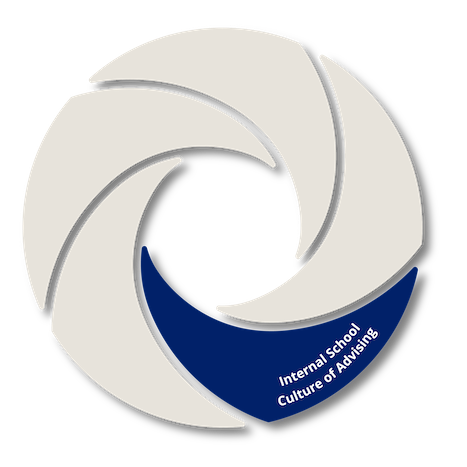District and Campus Commitments
These commitments describe the roles and responsibilities of the administrators who support, supervise, and manage the school counseling program staff.
- Administrators incorporate specific references to students’ postsecondary success in college and career, including careers in the military, in district and campus vision, mission, and goals.
- Administrators develop policies and practices to ensure that all students receive equitable advising services, free from bias, within the individual planning system.
- Administrators require training on the fundamentals of advising in the annual professional development for all staff.
- Administrators promote the integration of advising-related student support and materials into core and elective curriculum and support consistent collaboration between teachers and school counselors and advisors.
- Administrators clearly and frequently communicate that effective advising is led by the school counseling program staff but is a shared responsibility among all campus staff members through varying assigned roles and responsibilities.
- Administrators audit the master schedule and embed specific advising related courses and interventions to align with student grade level expectations.
Essential Actions
These actions describe what the most effective school counseling program staff do to implement and continuously improve an individual planning system.
Key Practices:
- The vision, mission, and goals of the Individual Planning System are:
- clearly defined and tied to student outcomes.
- represented in the district’s comprehensive school counseling program goals.
- aligned to and communicated within campus and district vision, mission, and goals.
- inclusive of the campus and district’s implicit and explicit values, priorities, and needs.
- A clear communication plan for the vision, mission, and goals of the individual planning system is in place to ensure buy-in and commitment across the district.
Key Practices:
- District staff who work directly with students are informed and aware of their role as advising support partners.
- Campus staff complete training on the structure of the advising services, academic and career related milestones for students in each grade level, and resources available to students and families.
- Campus staff complete training on basic college and career readiness concepts.
- Campus staff complete training on ensuring equal access as it relates to postsecondary advising.
- Campus staff are able and expected to answer basic advising questions and incorporate basic advising concepts in non-traditional advising settings (the classroom, the field, etc.).
- Campus staff follow a multi-tiered system of student support and refer students as needed to specific and appropriate staff.
- Campus staff appropriately document and communicate advising-related conversations with students to school counselors and advisors thereby aiding the school counseling staff in effectively guiding a student’s academic and career development and planning.
- Teachers collaborate with advising staff to include college and career readiness curriculum and instruction, which is aligned to student grade level expectations, in core content courses.
Key Practices:
- Campus staff have appropriate access to relevant student metrics via the caseload management or student information system.
- School counseling program staff, along with teaching staff, consistently share out and celebrate student success in demonstrating college, career, and military readiness.
- School counseling program staff regularly update teachers on students’ academic plan progress, identifying Tier 2 and 3 students for additional support.
- Campus staff analyze student advising program metrics and use data to inform curriculum and continued development of academic planning.
Key Practices:
- All students have multiple opportunities to share their perspectives on their postsecondary planning wants and needs.
- All students have access to their progress data and information periodically throughout the year and upon request.
- School counseling program staff exhibits inclusivity in the advising process and frequently shares resources with all students.
- School counseling program staff employs a multi-tiered system of support to meet the individual needs of students.
Key Practices:
- Parents and caregivers have multiple opportunities to share their perspectives on students' wants and needs.
- Parents and caregivers have access to student progress data and information periodically throughout the year and upon request.
- School counseling program staff shares student resources and advising curriculum with parents and caregivers at entry points of the advising program within the overall individual planning system.

